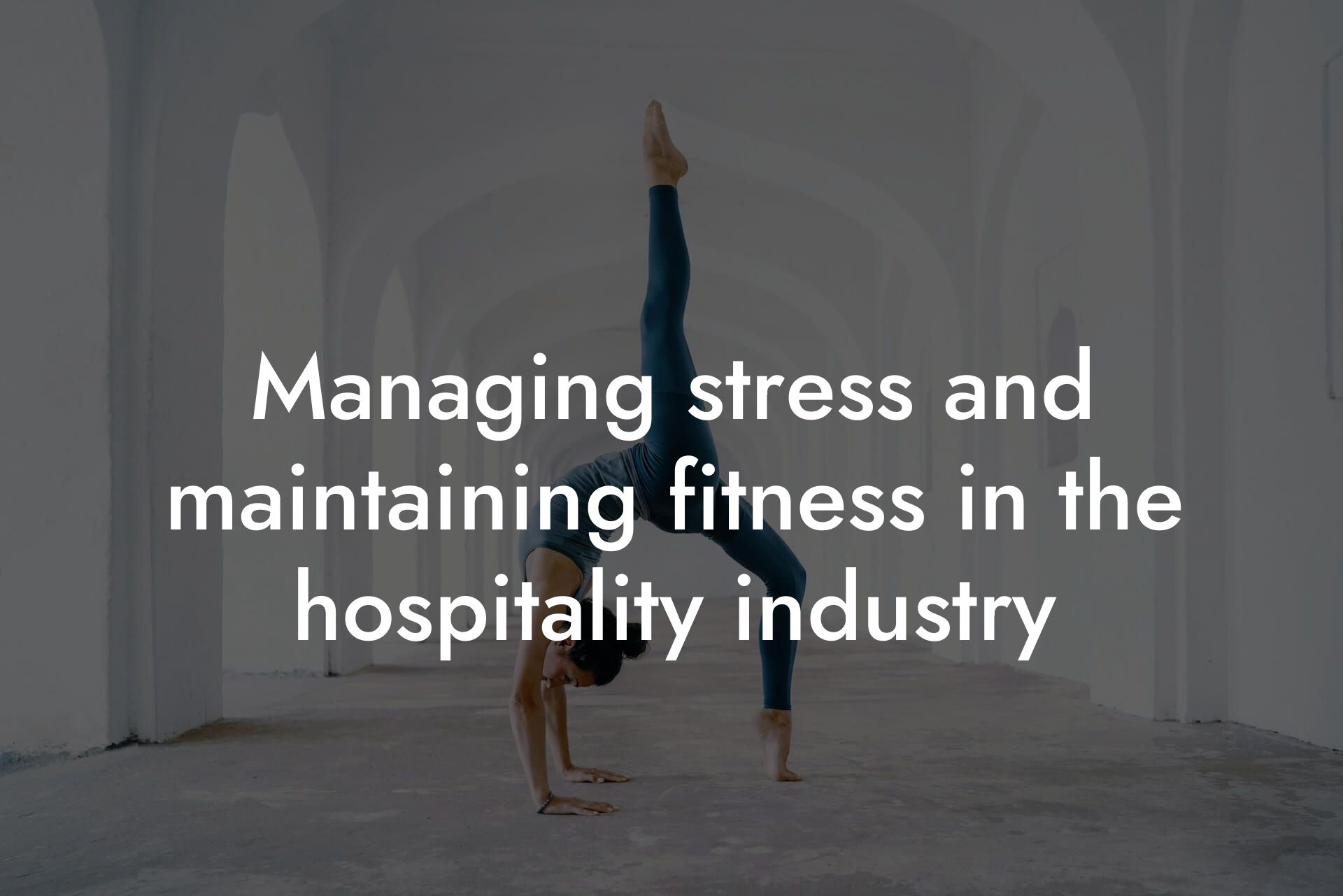As a hospitality professional, you know that your job can be physically demanding. Long hours on your feet, heavy lifting, and constant movement can take a toll on your body. However, it's essential to prioritize your physical health and stay active, even during the busiest of shifts. In this article, we'll provide you with practical tips and strategies to help you stay active, energized, and focused throughout your workday.
Table of Contents
- The Importance of Staying Active in Hospitality
- Challenges of Staying Active in Hospitality
- Simple Exercises for Busy Hospitality Professionals
- Incorporating Activity into Your Daily Routine
- Staying Hydrated and Fueled
- Managing Stress and Fatigue
- Tracking Your Progress and Staying Motivated
- Frequently Asked Questions
The Importance of Staying Active in Hospitality
Staying active is crucial in the hospitality industry, where physical demands can be high. Regular physical activity can help improve your overall health, increase energy levels, and reduce the risk of injury. Moreover, being physically fit can also enhance your mental well-being, allowing you to better cope with the stresses of the job. By prioritizing physical activity, you can improve your job performance, increase job satisfaction, and reduce the risk of burnout.
Challenges of Staying Active in Hospitality
Despite the importance of staying active, hospitality professionals often face significant challenges in doing so. Long hours, irregular schedules, and high-pressure work environments can make it difficult to find time for physical activity. Additionally, the physical demands of the job can leave you feeling exhausted, making it hard to muster the energy to engage in exercise. However, with a little creativity and planning, it's possible to overcome these challenges and prioritize your physical health.
Simple Exercises for Busy Hospitality Professionals
You don't need to have a gym membership or a lot of free time to stay active. Here are some simple exercises you can do during your shift or on your breaks:
- Take the stairs instead of the elevator
- Do a few jumping jacks or stretching exercises during your breaks
- Walk around the hotel or restaurant during your downtime
- Do some desk stretches or chair squats
- Take a short walk outside during your lunch break
These exercises may seem small, but they can make a significant difference in your overall physical activity levels.
Incorporating Activity into Your Daily Routine
In addition to incorporating simple exercises into your shift, you can also make small changes to your daily routine to increase your physical activity levels. Here are some ideas:
- Take a short walk to work or park further away from the hotel or restaurant
- Take the bus or train instead of driving
- Do a few minutes of yoga or stretching in the morning
- Take a short walk during your breaks instead of sitting down
By incorporating physical activity into your daily routine, you can increase your energy levels, improve your mood, and reduce your risk of chronic diseases.
Staying Hydrated and Fueled
Staying hydrated and fueled is essential for maintaining energy levels and staying active during your shift. Here are some tips:
- Drink plenty of water throughout your shift
- Avoid sugary drinks and caffeine that can lead to energy crashes
- Eat nutritious meals and snacks that include plenty of fruits, vegetables, and whole grains
- Avoid heavy meals that can make you feel sluggish
By staying hydrated and fueled, you can maintain your energy levels and stay focused throughout your shift.
Managing Stress and Fatigue
Stress and fatigue are common challenges in the hospitality industry. Here are some tips to help you manage stress and fatigue:
- Take regular breaks to stretch and move around
- Practice deep breathing exercises or meditation to reduce stress
- Get enough sleep and prioritize self-care
- Seek support from colleagues or a mental health professional if needed
By managing stress and fatigue, you can improve your overall well-being and stay active and focused during your shift.
Tracking Your Progress and Staying Motivated
Tracking your progress and staying motivated is essential for maintaining a physically active lifestyle. Here are some tips:
- Use a fitness tracker or pedometer to track your daily activity levels
- Set realistic goals and rewards for yourself
- Find a workout buddy or accountability partner
- Celebrate your successes and don't be too hard on yourself when you miss a day
By tracking your progress and staying motivated, you can maintain your physical activity levels and stay active and focused during your shift.
Staying active during busy shifts in the hospitality industry can be challenging, but it's not impossible. By incorporating simple exercises into your daily routine, staying hydrated and fueled, managing stress and fatigue, and tracking your progress, you can maintain your physical activity levels and stay active and focused during your shift. Remember, every small step counts, and even small changes can make a significant difference in your overall health and well-being.
At Tano Performance Group, we understand the importance of physical health and well-being for high-earning professionals. Our DEXA machine provides a complete body assessment, giving you the information you need to take your physical health to the next level. Contact us today to learn more about how we can help you achieve your fitness goals.
Frequently Asked Questions
What are the common challenges hospitality professionals face in staying active during busy shifts?
Hospitality professionals often face challenges such as long hours on their feet, limited breaks, and high-pressure environments, making it difficult to prioritize physical activity. Additionally, the nature of their work may involve sedentary tasks, further reducing opportunities for movement.
Why is it important for hospitality professionals to stay active during busy shifts?
Staying active during busy shifts can help hospitality professionals maintain their physical and mental well-being, improve their overall job performance, and reduce the risk of chronic diseases associated with sedentary behavior.
How can hospitality professionals incorporate physical activity into their daily routine?
Hospitality professionals can incorporate physical activity into their daily routine by taking short breaks to stretch, going for a walk during their lunch break, or doing a few jumping jacks during downtime. Every bit counts, and even small amounts of physical activity can make a significant difference.
What are some simple exercises that hospitality professionals can do during breaks?
Simple exercises that hospitality professionals can do during breaks include shoulder rolls, wrist extensions, toe taps, and leg stretches. These exercises can help reduce muscle tension and improve circulation.
How can hospitality professionals stay hydrated during busy shifts?
Hospitality professionals can stay hydrated during busy shifts by drinking water regularly, avoiding sugary drinks, and eating hydrating foods such as fruits and vegetables. It's also essential to limit caffeine intake, which can lead to dehydration.
What are some healthy snack options for hospitality professionals?
Healthy snack options for hospitality professionals include nuts, fruits, carrot sticks with hummus, and energy bars. It's essential to choose snacks that are nutrient-dense and low in added sugars, salt, and unhealthy fats.
How can hospitality professionals prioritize self-care during busy shifts?
Hospitality professionals can prioritize self-care during busy shifts by taking short breaks to meditate, practicing deep breathing exercises, and setting boundaries with colleagues and guests. Self-care is essential for maintaining physical and mental well-being.
What are some stress-reducing techniques that hospitality professionals can use during busy shifts?
Stress-reducing techniques that hospitality professionals can use during busy shifts include visualization, progressive muscle relaxation, and mindfulness meditation. These techniques can help reduce stress and anxiety, improving overall job performance.
How can hospitality professionals stay energized during long shifts?
Hospitality professionals can stay energized during long shifts by getting enough sleep, eating nutritious meals, and avoiding sugary and caffeinated drinks. It's also essential to take regular breaks to stretch and move around.
What are some common mistakes that hospitality professionals make when trying to stay active during busy shifts?
Common mistakes that hospitality professionals make when trying to stay active during busy shifts include not prioritizing self-care, not taking regular breaks, and not eating nutritious meals. These mistakes can lead to burnout, fatigue, and decreased job performance.
How can hospitality professionals overcome the challenge of limited time and resources?
Hospitality professionals can overcome the challenge of limited time and resources by finding creative ways to incorporate physical activity into their daily routine, such as taking the stairs instead of the elevator or doing a few jumping jacks during commercial breaks.
What are some benefits of incorporating physical activity into daily routine for hospitality professionals?
The benefits of incorporating physical activity into daily routine for hospitality professionals include improved job performance, increased energy levels, and reduced risk of chronic diseases. Physical activity can also improve mental well-being, reducing stress and anxiety.
How can hospitality professionals make physical activity a habit?
Hospitality professionals can make physical activity a habit by setting realistic goals, finding an exercise buddy, and tracking their progress. It's also essential to find activities that are enjoyable and convenient, making it more likely to stick to a routine.
What are some common misconceptions about physical activity for hospitality professionals?
Common misconceptions about physical activity for hospitality professionals include the idea that they don't have time, that they need to be athletic, or that they need to join a gym. The truth is that every bit of physical activity counts, and even small amounts can make a significant difference.
How can hospitality professionals get support from their employer to prioritize physical activity?
Hospitality professionals can get support from their employer to prioritize physical activity by suggesting wellness programs, requesting access to fitness classes, or proposing healthy snack options in the break room. Employers can also provide incentives for employees who prioritize physical activity.
What are some resources available to hospitality professionals who want to prioritize physical activity?
Resources available to hospitality professionals who want to prioritize physical activity include fitness apps, wellness programs, and health coaching services. Tano Performance Group also provides valuable resources and information on physical activity and wellness.
How can hospitality professionals measure the success of their physical activity routine?
Hospitality professionals can measure the success of their physical activity routine by tracking their progress, setting realistic goals, and monitoring their overall health and well-being. It's essential to celebrate small victories and make adjustments as needed.
What are some common barriers to physical activity for hospitality professionals?
Common barriers to physical activity for hospitality professionals include lack of time, lack of energy, and lack of motivation. Other barriers may include physical limitations, lack of access to fitness facilities, or unsupportive work environments.
How can hospitality professionals overcome the challenge of physical limitations?
Hospitality professionals can overcome the challenge of physical limitations by finding adaptive exercises, working with a health coach, or modifying their physical activity routine to accommodate their needs. It's essential to prioritize physical activity, even if it's just a few minutes a day.
What are some benefits of prioritizing physical activity for hospitality professionals' overall career?
The benefits of prioritizing physical activity for hospitality professionals' overall career include improved job performance, increased job satisfaction, and reduced risk of burnout. Physical activity can also improve mental well-being, leading to better relationships with colleagues and guests.
How can hospitality professionals make physical activity a part of their long-term career goals?
Hospitality professionals can make physical activity a part of their long-term career goals by setting realistic goals, finding a workout buddy, and tracking their progress. It's essential to prioritize physical activity as part of a overall wellness plan, leading to a healthier and happier career.
Here are some related articles you might love...
- The impact of physical health on creativity in culinary arts
- Managing stress and maintaining fitness in the hospitality industry
- How chefs can maintain fitness despite long hours in the kitchen
- Quick workouts for chefs and hospitality staff
- The connection between physical fitness and guest satisfaction
- Balancing food tasting with personal fitness goals
- The importance of DEXA scans for culinary and hospitality professionals
- Nutrition tips for maintaining energy during long service hours
- The role of physical fitness in preventing kitchen-related injuries
Zak Faulkner
Zak Faulkner is a leading authority in the realm of physical health and body composition analysis, with over 15 years of experience helping professionals optimise their fitness and well-being. As one the experts behind Tano Performance Group, Zak has dedicated his career to providing in-depth, science-backed insights that empower clients to elevate their physical performance and overall health.
With extensive knowledge of DEXA technology, Zak specializes in delivering comprehensive body assessments that offer precise data on body fat, muscle mass, bone density, and overall physique. His expertise enables individuals to make informed decisions and achieve their fitness goals with accuracy and confidence. Zak’s approach is rooted in a deep understanding of human physiology, combined with a passion for helping clients unlock their full potential through personalised strategies.
Over the years, Zak has earned a reputation for his commitment to excellence, precision, and client-focused service. His guidance is trusted by top professionals who demand the best when it comes to their health. Whether advising on fitness programs, nutritional strategies, or long-term wellness plans, Zak Faulkner’s insights are a valuable resource for anyone serious about taking their health and fitness to the next level.
At Tano Performance Group, Zak continues to lead our Content Team revolutionising how professionals approach their physical health, offering unparalleled expertise that drives real results.




